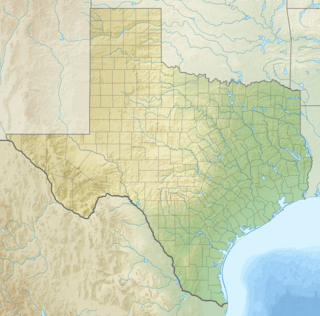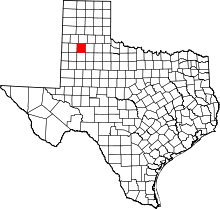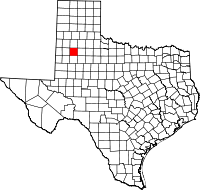Abernathy, Texas
| Abernathy, Texas | |
|---|---|
| City | |
|
Plains Grain Co. elevator near the tracks | |
 Abernathy Location of Abernathy in Texas | |
| Coordinates: 33°49′56″N 101°50′35″W / 33.83222°N 101.84306°WCoordinates: 33°49′56″N 101°50′35″W / 33.83222°N 101.84306°W[1] | |
| Country | United States |
| State |
|
| County | Lubbock and Hale |
| Region | Llano Estacado |
| Established | 1909 |
| Elevation[1] | 3,360 ft (1,020 m) |
| Population (2010) | |
| • Total | 2,805 |
| Time zone | CST (UTC-6) |
| ZIP code | 79311 |
| Area code | 806 |
| Website |
cityofabernathy |
Abernathy is a city in Hale and Lubbock counties in the U.S. state of Texas. The population was 2,805 at the 2010 census.[2]
The Hale County portion of Abernathy is part of the Plainview Micropolitan Statistical Area, while the Lubbock County portion is part of the Lubbock Metropolitan Statistical Area.
Geography
Abernathy (elev. 3,360) is located at 33°49′56″N 101°50′35″W / 33.83222°N 101.84306°W (33.8323038 -101.8429491).[3] Most of the city is located in Hale County; roughly 25% of the city extends southward into Lubbock County.
According to the United States Census Bureau, the city has a total area of 1.2 square miles (3.2 km2), all land.[2]
Climate
| Climate data for Abernathy, Texas | |||||||||||||
|---|---|---|---|---|---|---|---|---|---|---|---|---|---|
| Month | Jan | Feb | Mar | Apr | May | Jun | Jul | Aug | Sep | Oct | Nov | Dec | Year |
| Average high °F (°C) | 55.1 (12.8) |
57.2 (14) |
65.0 (18.3) |
72.4 (22.4) |
81.3 (27.4) |
89.1 (31.7) |
88.7 (31.5) |
89.5 (31.9) |
82.9 (28.3) |
73.9 (23.3) |
63.7 (17.6) |
55.3 (12.9) |
72.9 (22.7) |
| Average low °F (°C) | 24.2 (−4.3) |
26.3 (−3.2) |
34.0 (1.1) |
41.4 (5.2) |
52.1 (11.2) |
62.7 (17.1) |
64.8 (18.2) |
64.6 (18.1) |
57.4 (14.1) |
44.8 (7.1) |
32.4 (0.2) |
24.3 (−4.3) |
44.1 (6.7) |
| Average precipitation inches (mm) | 0.6 (15) |
0.7 (18) |
0.9 (23) |
1.2 (30) |
2.5 (64) |
2.9 (74) |
2.4 (61) |
2.3 (58) |
2.5 (64) |
1.8 (46) |
0.8 (20) |
0.7 (18) |
19.4 (493) |
| Source: Weatherbase [4] | |||||||||||||
| Historical population | |||
|---|---|---|---|
| Census | Pop. | %± | |
| 1930 | 858 | — | |
| 1940 | 847 | −1.3% | |
| 1950 | 1,692 | 99.8% | |
| 1960 | 2,491 | 47.2% | |
| 1970 | 2,625 | 5.4% | |
| 1980 | 2,904 | 10.6% | |
| 1990 | 2,720 | −6.3% | |
| 2000 | 2,839 | 4.4% | |
| 2010 | 2,805 | −1.2% | |
| Est. 2015 | 2,743 | [5] | −2.2% |
| 1930-2000[6] | |||
Demographics
As of the census[7] of 2000, there were 2,839 people, 996 households, and 800 families residing in the city. The population density was 2,402.0 people per square mile (928.9/km²). There were 1,081 housing units at an average density of 914.6 per square mile (353.7/km²). The racial makeup of the city was 76.15% White, 2.47% African American, 0.77% Native American, 0.14% Asian, 18.63% from other races, and 1.83% from two or more races. Hispanic or Latino of any race were 43.15% of the population.
There were 996 households out of which 38.8% had children under the age of 18 living with them, 65.5% were married couples living together, 10.9% had a female householder with no husband present, and 19.6% were non-families. 18.2% of all households were made up of individuals and 11.5% had someone living alone who was 65 years of age or older. The average household size was 2.85 and the average family size was 3.23.
In the city the population was spread out with 30.1% under the age of 18, 8.0% from 18 to 24, 25.5% from 25 to 44, 21.4% from 45 to 64, and 15.1% who were 65 years of age or older. The median age was 35 years. For every 100 females there were 95.9 males. For every 100 females age 18 and over, there were 88.5 males.
The median income for a household in the city was $31,377, and the median income for a family was $35,399. Males had a median income of $25,635 versus $21,198 for females. The per capita income for the city was $13,919. About 9.6% of families and 9.3% of the population were below the poverty line, including 8.3% of those under age 18 and 9.4% of those age 65 or over.
History
The Santa Fe Railroad wanted to follow a straight line from Plainview to Lubbock. A straight-line survey was run and it went east of the present site of Abernathy. This route did not please the residents of Hale Center, which had been established since the 1890s. They influenced the Santa Fe to come southwest out of Plainview to serve them, and from there the Santa Fe followed an approximate straight line into Lubbock.
The developers of the town sites along the new railroad wanted to organize a town on a section 4 miles (6 km) north of the present town of Abernathy.[8] The owners, who lived in Wisconsin, were contacted. They thought there might be gold on the land and refused to sell. Therefore, the last section south in Hale County was chosen as the town site.
Originally owned by John Y. Ligon, the section that was to become the Abernathy town site was purchased by J.C. Roberds from E.S. and W.L. Stanfield. When the South Plains Investment Company was formed by Roberds, Dr. M.C. Overton, and Monroe Abernathy, Mr. Roberds deeded the section to the firm and became the president of the firm.[8] Dr. Overton was secretary and Mr. Abernathy was treasurer.
On June 18, 1909, the official survey of the town site was recognized by Gov. T.M. Campbell. The town site was platted on July 8, 1909, and was named for M.C. Abernathy. Mr. Monk was the resident agent for the company, and a small frame office building was built. Lots and blocks were sold from there.
Since there were already several buildings in Bartonsite and none in Abernathy, the founding fathers here contracted with J.J. Barton to move some of the buildings to Abernathy. In the late summer of 1909 the move began. Buildings were placed on rollers. The latest equipment—steam-driven tractors—hooked on. The exodus began to huff and puff toward the new town. The tractors did not move but about three or four miles per hour, so it was a long trip. A two-story yellow hotel, a lumberyard, blacksmith shop, and three or four residences were some of the approximately ten buildings moved.
The first train came to Abernathy in the early fall of 1909.[8] This was not a regular train, but some cars added to the work train. It was a great day for all the settlers in the area.
The depot was constructed in 1909. C.E. Stout was the first local agent for the Santa Fe.
The section where the town of Abernathy was being developed was fenced, and gates had to be opened when entering and leaving town. The streets and block corners were laid off with 2 x 4 stubs. These stubs denoted streets for the next few years, until a grader finally came in to run ditches.
Town residents had free range on the section, and their milk cows and horses and mules were turned loose to graze. The stock would stray out of the section, and range cattle would come into town, when someone happened to leave the gates open. The ladies had to stand guard at their clotheslines to keep the livestock from ruining their laundry. When a load of feed was brought to town, the cattle and horses had to be chased away until it was unloaded in stack lots or barns. Trains running through the town section frequently hit the livestock.
Behind most of the houses were outhouses, barns, and windmills. Nearly every home had its own windmill, although a few families hauled water. Generally, gardens and cow lots were integral parts of each household.
Although the City of Abernathy was founded in 1909, it was not incorporated until 1924.[8] An election was called for September 12, 1924. The first mayor was F.W. Struve, and aldermen elected were R.M. Hardesty, N.C. Hix, Sam W. Smith, T.B. Stone, and E.B. Lindsey.
Schools
The Abernathy Independent School District has an elementary school, middle school, and high school, with a district-wide enrollment of 768 students.[9]
In popular culture
Abernathy is featured in the Branson musical 3 Redneck Tenors as the home of Billy Ray, "The Dead Tenor". A funeral is held for Billy Ray in Abernathy, "The Gateway to Lubbock".
See also
References
- 1 2 "Abernathy". Geographic Names Information System. United States Geological Survey.
- 1 2 "Geographic Identifiers: 2010 Demographic Profile Data (G001): Abernathy city, Texas". U.S. Census Bureau, American Factfinder. Retrieved January 17, 2013.
- ↑ "US Gazetteer files: 2010, 2000, and 1990". United States Census Bureau. 2011-02-12. Retrieved 2011-04-23.
- ↑ "Weatherbase: Historical Weather for Abernathy, Texas". Weatherbase. 2011. Retrieved on November 24, 2011.
- ↑ "Annual Estimates of the Resident Population for Incorporated Places: April 1, 2010 to July 1, 2015". Retrieved July 2, 2016.
- ↑ Texasalmanac. Retrieves 2012-10-04
- ↑ "American FactFinder". United States Census Bureau. Archived from the original on 2013-09-11. Retrieved 2008-01-31.
- 1 2 3 4 Duncan, Patricia L. "Abernathy, TX". Handbook of Texas Online. Retrieved 2013-03-20.
- ↑ "Abernathy ISD". Abernathy ISD. Retrieved 2012-01-06.
External links
| Wikivoyage has a travel guide for Abernathy. |
- City of Abernathy official website
- Abernathy Independent School District
- U.S. Geological Survey Geographic Names Information System: Abernathy, Texas
- Abernathy, TX from the Handbook of Texas Online


